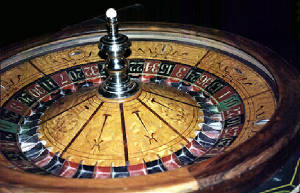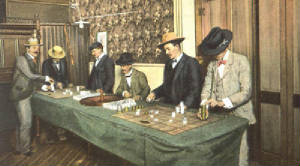|
 The history of roulette begins in France in 1655. The man responsible for the creation of the roulette wheel is famed mathematician Blaise Pascal. He made numerous contributions to mathematics, and is still one of history's most revered mathematical figures. The history of roulette begins in France in 1655. The man responsible for the creation of the roulette wheel is famed mathematician Blaise Pascal. He made numerous contributions to mathematics, and is still one of history's most revered mathematical figures.
Roulette's gambling potential was spotted early on but for the first nearly two centuries of its history the roulette wheel remained little changed from the original basic design created by Pascal. Then in 1842 two Frenchmen, Francois and Louis Blanc added a "0" to the numbers of the roulette wheel giving the wheel a total of 37 numbers, ranging from 0 to 36. By adding the "0" it increased the house odds of winning.
There is a tale that these two Frenchmen struck a deal with the devil in exchange for the secrets of roulette. This tale is partly inspired by the fact that if you add up all of the numbers to 36 you receive a sum of 666, the number of the beast.
Sometime during the 1800's Roulette traveled across the Atlantic Ocean to the United States. In the United States a double zero "00" was added for an even 38 numbers on the wheel. Sometimes you may find that the "00" was replaced with an American Eagle.
Any strategy involved in playing the game of roulette takes place in the betting. There can be no strategy involved in the spin of the roulette wheel itself, as the resting place for the little ball is based purely on chance or luck. A roulette wheel in the Old West featured thirty-seven and later thirty-eight compartments with numbers one to thirty six, zero and a double zero.
|


 Home
Home History
History THE GAMES
THE GAMES > Banked
> Banked > ShortCards
> ShortCards > Dice
> Dice > EQUIPMENT
> EQUIPMENT > The "Sports"
> The "Sports" Links
Links EMAIL
EMAIL Advertising
Advertising
 History
History THE GAMES
THE GAMES > Banked
> Banked > ShortCards
> ShortCards > Dice
> Dice > Wheel
> Wheel > EQUIPMENT
> EQUIPMENT > The "Sports"
> The "Sports" Links
Links EMAIL
EMAIL Advertising
Advertising

 > Wheel
> Wheel The history of roulette begins in France in 1655. The man responsible for the creation of the roulette wheel is famed mathematician Blaise Pascal. He made numerous contributions to mathematics, and is still one of history's most revered mathematical figures.
The history of roulette begins in France in 1655. The man responsible for the creation of the roulette wheel is famed mathematician Blaise Pascal. He made numerous contributions to mathematics, and is still one of history's most revered mathematical figures.